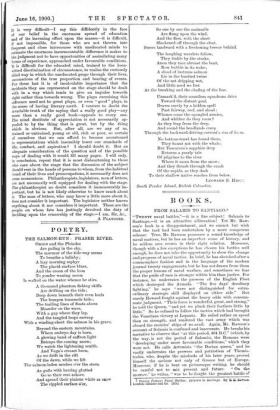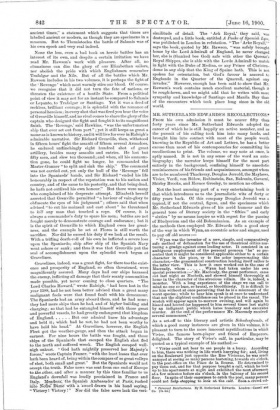BOOKS.
FROM SALAMIS TO SANTIAGO.*
"TWENTY naval battles,"—it is a fine subject! Salamis to Santiago,—it is an attractive alliteration ! Yet Mr. Raw- son's book is a disappointment, and we cannot but wish that the task had been undertaken by a more competent scholar. True, Mr. Rawson possesses a sound knowledge of naval matters, but he has an imperfect sense of history, and he seldom sees events in their right relation. Moreover, though with a few exceptions he has chosen his battles well enough, he does not take the opportunity to show the change and progress of naval tactics. In brief, he has sketched after a commonplace fashion and in the language of the modern journal twenty engagements, but he has not drawn from them the proper lessons of naval warfare, and sometimes we fear that the pride of race is stronger within him than justice. For instance, he underrates the prowess of the English Fleet which destroyed the Armada. "The five days' desultory fighting," he says "were not distinguished for extra- ordinary strategic skill displayed on either side." But surely Howard fought against the heavy odds with consum- mate judgment. "Their force is wonderful, great, and strong," he told the Queen, "and yet we pluck their feathers little by little." So he refused to follow the tactics which had brought the Venetians victory at Lepanto. He relied rather on speed than on strength, and rendered the vast army which was aboard the enemies' ships of no avail. Again, Mr. Rawson's account of Salamis is confused and inaccurate. He breaks his narrative to observe that "at this period, 494 B.C." (which, by the way, is not the period of Salamis), the Romans were "developing under more favourable conditions," which they were not. He calls Artemisia "the Dorian queen," and he vastly underrates the prowess and patriotism of Themis- tocles, who, despite the misdeeds of his later years, proved himself the saviour not only of Greece but of Europe. Moreover, if he is bent on picturesque writing, he should be careful not to mix present and future. "On the morrow," he writes, "was to be fought the greatest battle of
•
9 Twenty Famous Naval Battles: Salamis to Santiago. Dy E. X. Bawson. London : Lsbiater and Co. Pls.]
ancient times," a statement which suggests that times are labelled ancient or modern, as though they are specimens in a museum. But to Themistocles the battle of Salamis was of his own epoch and very real indeed.
None the less, even a bad book on heroic battles has an interest of its own, and despite a certain irritation we have read Mr. Rawson's work with pleasure. After all, no clumsiness can dim the glory of our Elizabethan sailors, nor abolish the pride with which Englishmen remember Trafalgar and the Nile. But of all the battles which Mr. Rawson includes in his two volumes, it is perhaps the fight of the 'Revenge' which most warmly stirs our blood. Of course, we recognise that it did not turn the fate of nations, or threaten the existence of a hostile State. From a political point of view it may not for an instant be compared to Salamis or Lepanto, to Trafalgar or Santiago. Yet it was a deed of reckless, brilliant courage; it is splendid with the romance of personal heroism; in every shot that was fired you hear the voice of Grenville himself, and no rival comes to share the glory of the captain who designed the fight and fought it to its magnificent finish. The 'Revenge,' said Hawkins, "was the unfortunatest ship that ever set out from port" ; yet it still keeps as great a name as is known to history, and it will live for ever in Raleigh's admirable narrative. Sir Richard Grenville, then, withstood in fifteen hours' fight the assault of fifteen several Armadoes, he endured unflinchingly eight hundred shot of great artillery, besides many assaults and entries. He lost but fifty men, and slew ten thousand ; and when, all his ammuni- tion gone, he could fight no longer, he commanded the Master-Gunner "to split and sink the ship." The command was not carried out, yet only the hull of the 'Revenge' fell into the Spaniards' hands, and Sir Richard "ended his life honourably in respect of the reputation won to his nation and country, and of the same to his posterity, and that being dead, he bath not outlived his own honour." But there were many who complained of his desperate attempt. Elizabeth herself asserted that Grenville permitted "a havionr of vain-glory to obfuscate the eyes of his judgment " ; others said that when advised "to cut his mainsail sail and cast about" he threatened to kill any man that touched a rope. Of course, it is always a commander's duty to spare his men; battles are not fought merely to demonstrate courage and endurance ; but it is the spirit of Grenville to which England owes her great- ness, and the example he set at Flores is still worth the sacrifice. Nor did he exceed his duty if we look at the result. With a trifling death-roll of his own he inflicted a severe loss upon the Spaniards; ship after ship of the Spanish Navy went ashore or sank ; and thus it was that Grenville put the seal of accomplishment upon the splendid work begun at Gravelines.
Gravelines, indeed, was a great fight, for there too the exist- ence and prosperity of England, so often threatened, were magnificently assured. Many days had our ships harassed the enemy, inflicting all damage that their scanty ammunition made possible, yet never coming to close quarters. "The Lord Charles Howard," wrote Raleigh, "had been lost in the year 1588, had he not been better advised than a great many malignant fools were that found fault with his demeanour. The Spaniards had an army aboard them, and he had none ; they had more ships than he had, and of higher building and charging; so that had he entangled himself with those great and powerful vessels, he had greatly endangered that kingdom
of England. But our admiral knew his advantage and held it; which had he not, he had not been worthy to have held his head." At Gravelines, however, the English Fleet got the weather-gauge, and then the attack began in earnest. For nine hours the battle was fought, and those ships of the Spaniards that escaped the English shot fled to the north and suffered wreck. The English escaped well- nigh unhurt. "God hath mightily preserved her Majesty's forces," wrote Captain Fenner, "with the least losses that ever hath been heard of, being within the compass of so great volleys of shot, both small and great." But the Spaniards would not accept the. truth. False ne3vs was sent from one end of Europe to.the_other, and after, a manner. by this time familiar to us England's downfall was loudly proclaimed. in France and Italy. Men4oza; the Spanish Ambassador at Perla, 'twilled ifanie with I iiivoid drawn in hie. saying, " Victory ! -Victory"! " 'Nor did 'the false news lack the veri- similitude of detail. The Ark Royal,' they said, was destroyed, and a little book, entitled A Packs of Spanish Lyes, was published in London in refutation. "The Arke Royall,' " says the book, quoted by Mr. Rawson, "was safely brought home by the Lord Admiral of England, he• never changed her, she is (thanked bee God) safe with other the Queene's Royal Shippes, she is able with the Lorde Admirall to match in fight with the Duke of Medina, or any Prince of Christen. domein any ship that the King of Spaine hath. This is not spoken for ostentation, but God's favour is assured to Englande in the Quarter of the Quarrell, against any invader." However, enough has been said to show that Mr. Rawson's work contains much excellent material, though it be rough-hewn, and we might add that he writes with more sympathy and knowledge of Santiago and Manila Bay than of the encounters which took place long since in the old world.







































 Previous page
Previous page